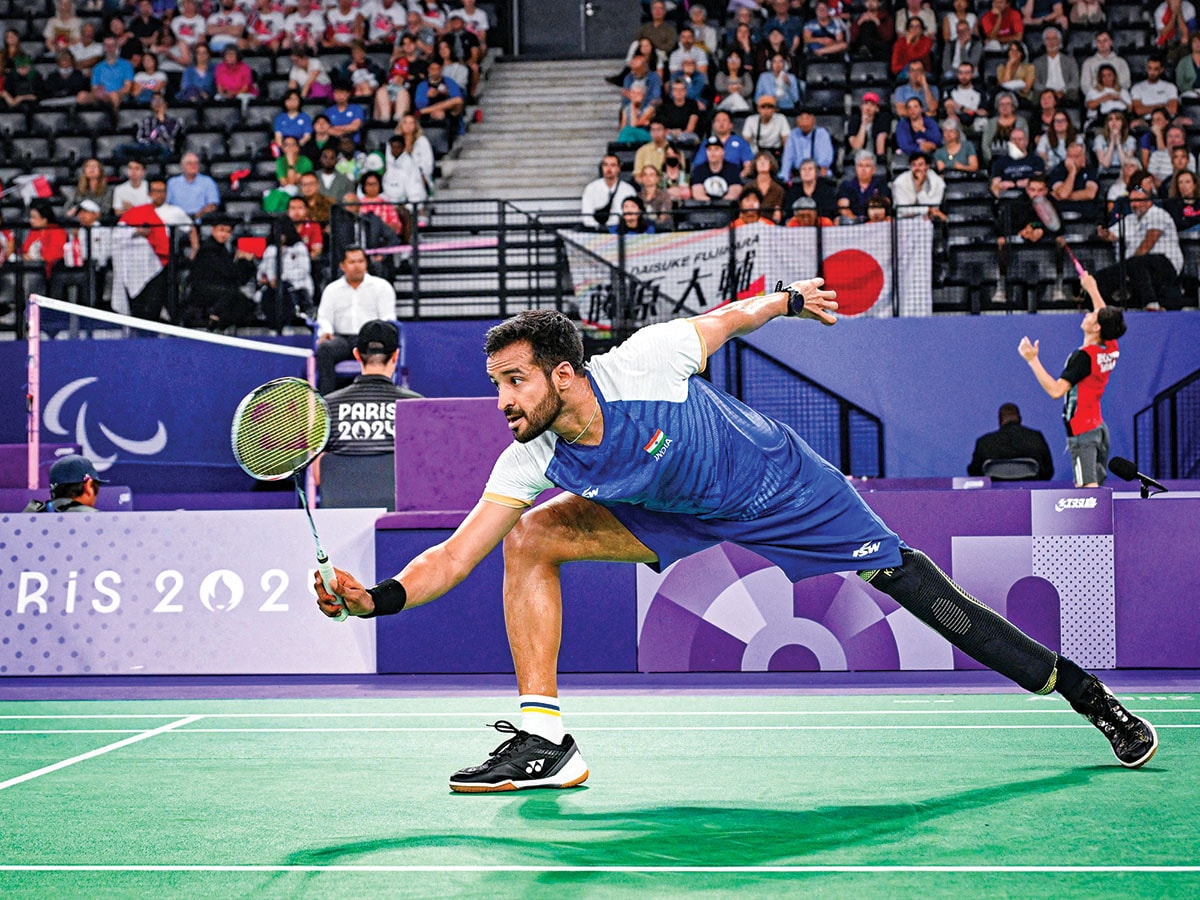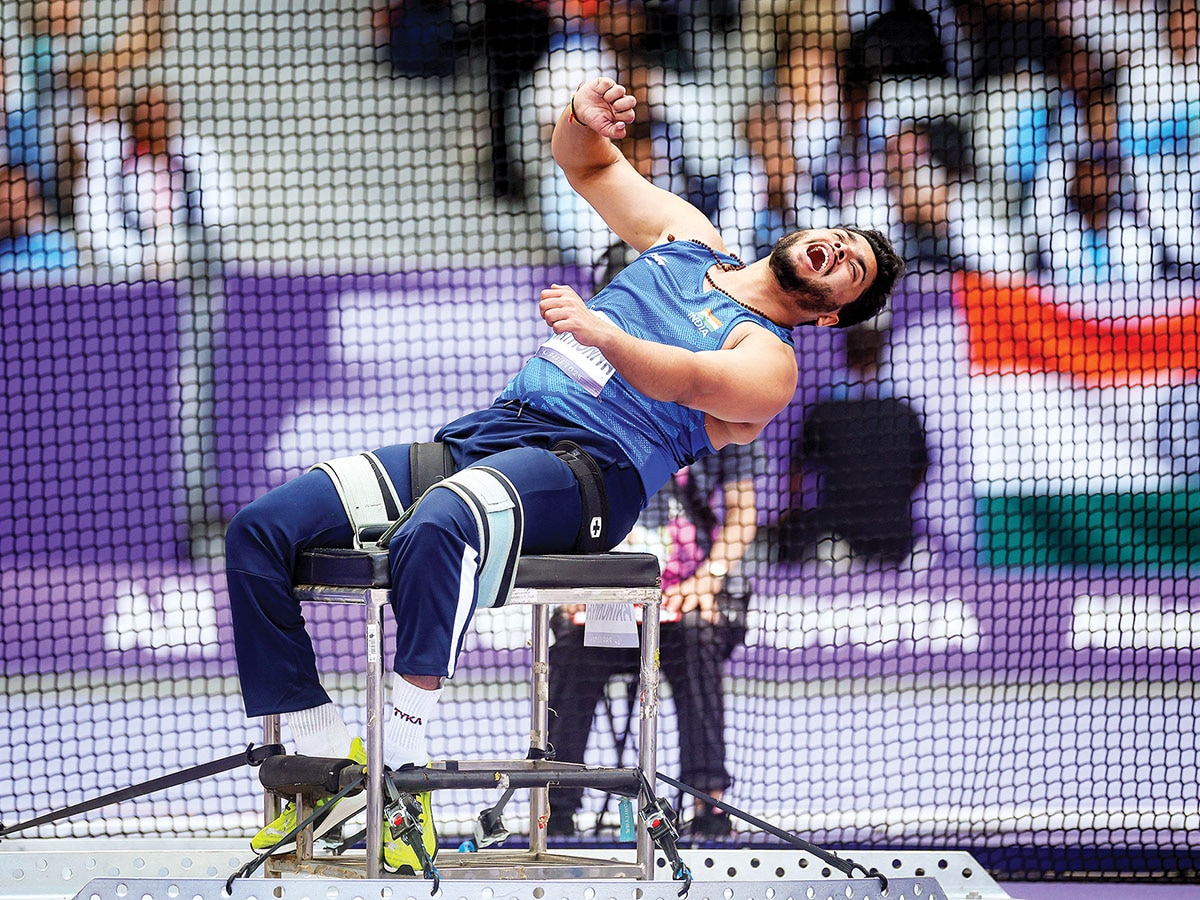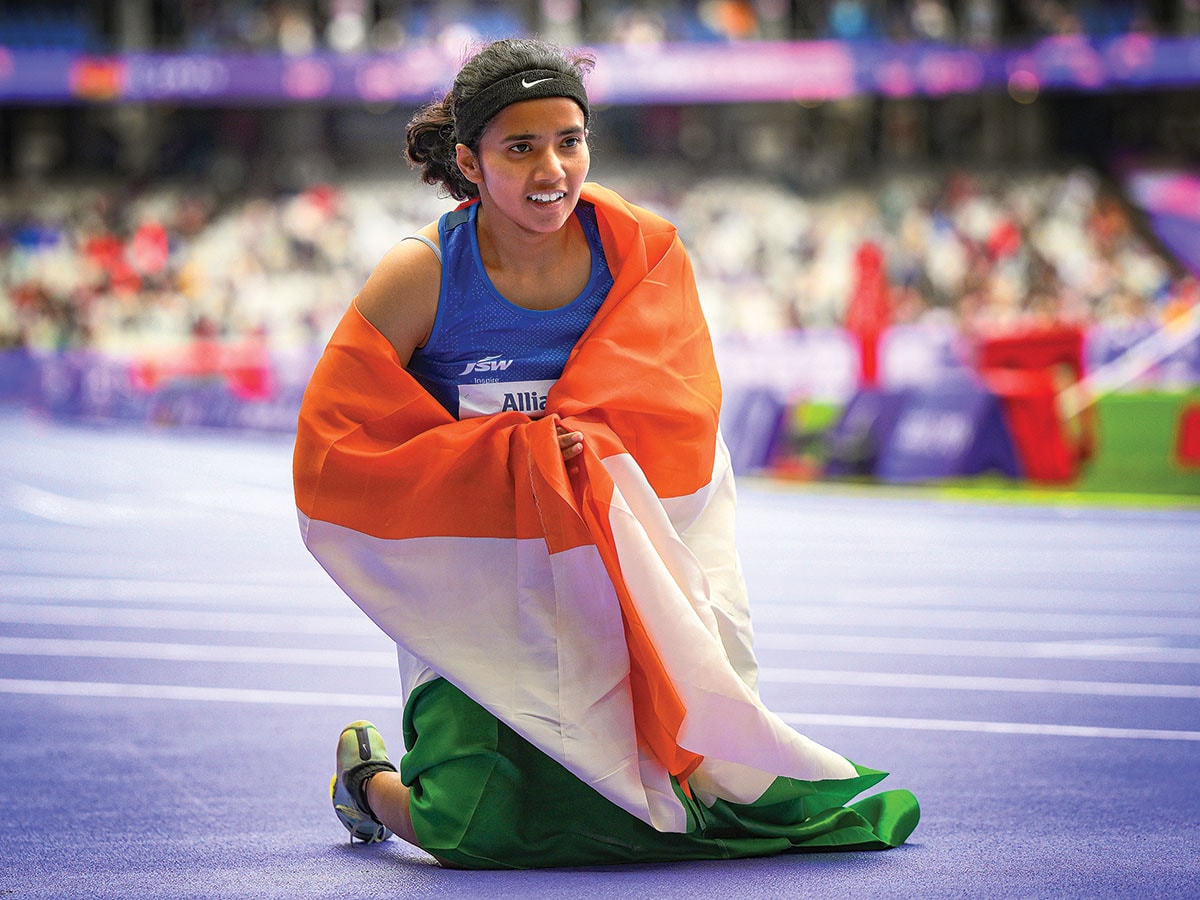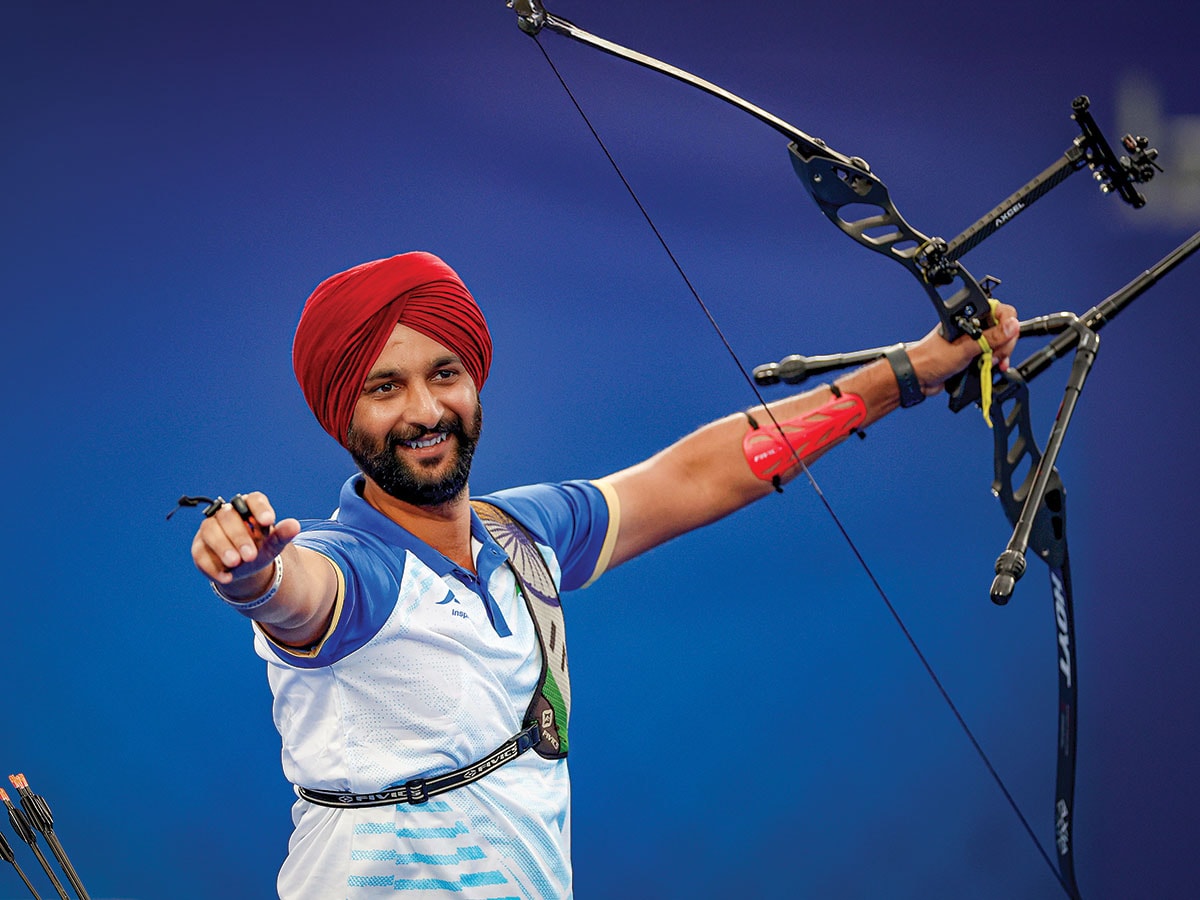Harvinder Singh was assured of a medal the moment he was in the final, but the archer repeatedly told himself not to think of a silver when he had a chance to win gold. At the same time, he didn’t put undue pressure on himself by thinking he’s bagging a medal for the country at one of the most prestigious events. “There was no thought of winning or losing. That could have led to mistakes. I decided to play freely and give it my best,” he says. And the results spoke for themselves.
Thirty-three-year-old Singh became the first Indian to win a gold medal in archery at the Paralympics after defeating Poland’s Lukasz Ciszek 6-0 in the final. His feat in Paris 2024 followed his historic bronze medal win at the 2020 Tokyo Paralympics. “I watched my Tokyo matches multiple times… I saw the mistakes I made in the semis. This time, I told myself not to repeat them,” he says. “I was sure that I didn’t want to play the match for a bronze medal because if you lose that, you return empty-handed. I was keen on getting into the finals.”
Usually calm and composed, Singh screamed with excitement after his win and attended a flurry of phone calls thereafter. The celebrations continued with incessant messages and several dinner outings when he returned to India.
“I had always believed in Harvinder’s potential, but his 2024 gold was a testament to his hard work and dedication. The feeling was overwhelming—a mix of pride, joy and satisfaction,” says Gaurav Sharma, his coach. “He is an exceptionally talented archer with a strong work ethic. His strengths are his unwavering focus and determination, the ability to adapt to pressure situations and his excellent technique.”
Born into a farmer family in Kaithal, Haryana, Singh contracted a fever when he was a year and a half old. A wrong medical treatment severely impacted his mobility that eventually impaired his leg movements.
When he was around five, he realised his disability and the fact that he was different from others. For instance, while playing cricket, he needed a runner and would always be asked to keep wickets since he could not run around as a fielder. “As a child, I wanted to play like the others, but there were limitations. There was trouble commuting to school, for example,” he recalls. “But now when I look back, I realise the journey has been different… I learnt a lot from it. It has made me stronger.”
It helped that his family and friends were supportive, and no one taunted him for his condition. In fact, he even helped his parents with things like farming. “If you allow the disability to play on your mind, it can prove to be detrimental. I converted this into my weapon. I told myself that I am not weak or different,” says Singh, who graduated from Punjabi University in Patiala.
Inspired by the 2012 Paralympics, he decided to focus on sport as a career. Watching people his age playing on the university grounds spurred him on and he took interest in archery. “I had seen this in Ramayana and Mahabharata, and found it interesting,” he says.
He would practice for 6 hours a day and bunk the last lecture for training when he was in the last year of college. However, he lost the motivation and quit playing the game for a couple of months after losing a few initial tournaments. But his coach encouraged him to not give up. “I recall Harvinder’s struggles and frustration, which led him to consider quitting archery. But I understood his potential and believed in him. I motivated him to rediscover his passion and work towards his goals,” says Sharma.
Eventually, he won two bronze medals in the nationals and a silver after. Such successes boosted his confidence. Singh intensified his training and began doing yoga and meditation apart from going to the gym for strength training. “Harvinder’s training regimen was rigorous and well-structured. He dedicated himself to intensive physical conditioning, technical precision, and mental preparation and visualisation techniques,” explains Sharma.
Amid all this, he maintained his focus on academics and is currently pursuing his PhD in economics. “I believe one must keep learning and hence I did not want to stop studying,” says Singh, who was supported by the Haryana state government after his victory in the nationals, Olympic Gold Quest—a non-profit foundation that supports athletes—and TOPS (the central government’s Target Olympic Podium Scheme).
The ultimate goal, though, is to achieve sporting glory. “I want to win more medals for my country. I don’t have a World Championship medal and would like to open my account there. I’ll work hard for it,” he says.
Gold Standard
 Nitesh Kumar in action at the 2024 Paris Paralympics against Daniel Bethell of Britain
Nitesh Kumar in action at the 2024 Paris Paralympics against Daniel Bethell of Britain
Image: Jennifer Lorenzini / Reuters
During the men’s singles SL3 class final at the 2024 Paris Paralympics, Nitesh Kumar was leading 17-13 before his opponent, Great Britain’s Daniel Bethell, turned the tide and took the score to 21-20 in his favour. The latter had won against the Indian in their previous nine encounters and was likely to maintain his unbeaten record given the way he came back into the tense match. Kumar, though, kept his cool and eventually won the game to win a gold medal.
“I thought of being disciplined at that time and not overdoing anything. I decided to stay positive and play the best strokes in my game,” says Kumar, who had missed out on the 2020 Tokyo Paralympics. “The most special thing about the victory was that the same event was won by Pramod Bhagat in Tokyo… so, retaining the medal for India was immensely satisfying. Individually it was a milestone for me because I had never won against him.”
The two players, ranked No 1 and No 2 in the world, were expected to slug it out for a gold medal. Kumar had studied Bethell’s game in the run-up to the final. He had, however, not played on that court. So, he decided to take the first four or five points long. “I could sense the pressure on him to win because of our 9-0 scoreline in previous meetings and also due to the fact that Pramod was not playing in Paris,” explains Kumar. “It was all about staying positive, patient and not losing my calm in tricky situations.”
An IIT graduate, Kumar knows a thing or two about not giving up. The 30-year-old who loved playing football as a youngster wanted to join the Armed forces—his father was a Navy officer—before life took a tragic turn. When he was 15, he fell off a moving train in Visakhapatnam, Andhra Pradesh, while returning from a local football tournament.
“It was a complete shock for me… I had to get my leg amputated. I didn’t know what do in life,” recalls Kumar, who hails from Rajasthan but is settled in Haryana. “Using prosthetics was physically tiring and painful. There were a lot of times when I felt like giving up.”
His father kept the hope alive in Kumar and motivated him to look at life differently. He would share videos of people with prosthetics and the various things they did. When Kumar visited the Artificial Limbs Centre in Pune, he saw a ray of hope. The teen watched Army veterans, who had lost limbs in wars or accidents, running, playing volleyball and cycling with prosthetics. “Watching them was a confidence booster,” he admits. “I didn’t want to spend my life on a wheelchair. I was just 15… I had my whole life ahead of me.”
Kumar didn’t think of playing the sport immediately though. He decided to focus on his studies and getting into IIT. Elders around him had ingrained in him that people with disabilities could get good desk jobs, but education was mandatory.
Once he got into IIT-Mandi, he began playing badminton. Slowly, he developed an interest in the game, but his goal was restricted to playing every tournament for the institute. It was after he got to know about para sports that he decided to pursue it seriously.
“His game was of high standard when we started in January 2023. He is naturally talented and a smart player on court,” says Rajendra Jakkampudi, his coach. “We had noticed that during long matches, he would get tired or get cramps during the third set. So, we planned different programmes to enhance his skills and potential… that’s how we got a gold.”
Kumar says the Olympic Gold Quest and the central government’s TOPS played a big role in his victory. Till then, he concedes that he hadn’t understood the importance of fitness and diet, and how those could impact one’s game.
Jakkampudi describes Kumar as a positive and smart athlete. “He’s mentally strong. He’ll never show his emotions on or off court. And he’s disciplined… he was there on time for every training session, never late,” he says. He adds they will be working on a few more things prior to the World Championships. “He’ll be a next-level player after that. The others will find it difficult to even come close to him.”
The Paris gold meant a lot to Kumar since he hadn’t qualified for the 2020 Tokyo Paralympics. The shuttler called Bhagat after his win to say that he had retained India’s medal. “It was an emotional call… I told him to come back [post his injury] so that we can defend the medal in the 2028 edition,” says Kumar, who loves driving and listening to music.
The immediate goal, though, is to open his account in the World Championships. “I have yet to win a gold there… of course, the final aim would be to defend my title in 2028,” says Kumar.
Also read: From Jasprit Bumrah to D Gukesh: Showstoppers 2024-25, Sports Edition
Silver Lining
 Yogesh Kathuniya at the Men’s Discus Throw F56 Final at the Paris 2024 Summer Paralympic Games
Yogesh Kathuniya at the Men’s Discus Throw F56 Final at the Paris 2024 Summer Paralympic Games
Image: Ezra Shaw / Getty Images
Yogesh Kathuniya had never celebrated his victories. He didn’t feel the need to. Until he saw an Instagram reel that said every sportsperson must enjoy the smallest of wins because it boosts their confidence. So, when he won a silver medal in the men’s para discuss F56 category at the 2024 Paralympics, he went on his first solo trip to Switzerland, Dubai and a few other countries. The time with himself after the intense event allowed the 27-year-old to reflect on his glory; he had won a silver at the 2020 Paralympics in Tokyo as well.
“I was thrilled to win a second Paralympic medal,” he says. At the same time, there was disappointment that he could not win a gold. “I didn’t feel the pressure when I won in Tokyo, but there were expectations from me this time. As a result, there was added pressure. I tried my best to focus on the game, but the pressure did get to me,” he admits.
Kathuniya concedes that his warm-up throw was not good enough. He vows to work harder rather than focusing on the results the next time.
His coach Lakhwinder Singh says they had prepared well and were confident of a win. Without citing it as an excuse, he says the cold climate in Paris, unlike the hot and humid conditions in India, did not suit the discus thrower. “Yogesh pulled his deltoid muscle during his warm-up throw… thereafter, he could not throw properly. He was experiencing some pain,” says Singh, explaining why it became challenging to attempt six throws in four minutes subsequently.
Singh emphasises, though, that winning two back-to-back silver medals in such global events is a huge achievement. The athlete delivered a season-best throw of 42.22 m to secure a podium finish. The coach now wants him to record a 50-plus m throw in the 2028 edition. “We want to have a world record,” he says.
Born in Haryana, Kathuniya was diagnosed with Guillain-Barre syndrome, a rare neurological disorder that left him wheelchair-bound for three years. “I used to wonder when I’d be able to get up and play like other kids my age. There were no mobile phones then and hardly anything else for entertainment,” he recalls. His older sister would assure him that he’d be able to play from the next day, but that didn’t happen for months and years. “There was not much awareness about disability either. People would look at me differently and that would make me anxious. I used to feel shy to step out,” adds Kathuniya.
Kathuniya’s father was in the Army and earned around ₹30,000 a month. It was financially difficult to look after his two daughters apart from paying for his son’s treatment. They called a physiotherapist for a couple of months, but could not afford the cost thereafter. So, his mother learnt physiotherapy and took charge of his recovery.
Not someone to lose hope, Kathuniya saw his disability as an opportunity to represent India. “If I have emerged successful from a population of 1.4 crore people, this has to be God’s gift,” he says wistfully. “Yes, there have been shortcomings in life, but God has blessed me with a lot more than that. I became mentally strong with such thinking.”
While pursuing his chartered accountancy (CA), his seniors informed him about para sports and told him he should go for it. The six-feet-tall youngster, who was into bodybuilding and had 16-inch biceps to go with six-pack abs, fell in love with the sport almost instantly. The initial struggle was to find balance because of his medical condition. “It’s a neurological disorder, so I couldn’t strain myself—physically and mentally—since it was related to the nerves. I worked on my fitness and learnt to deal with it. I took it step by step,” says Kathuniya, who left his CA studies for sport.
What followed was a rigorous training routine of eight hours a day. “Yogesh was extremely punctual, sincere and disciplined during those long sessions. He did yoga and meditation too,” says Singh, who first started coaching Kathuniya in 2020 in Haryana’s Ambala district. “His muscle quality was good… we improved on that. We began doing stability exercises with a stick.”
The results started showing. He even got a job with an annual package of ₹20 lakh, but gave that up to pursue sport. It wasn’t easy convincing his family, but his faith in himself paid dividends when he won the Arjuna Award in 2021. “I used to tell my mother that people should know me. Today, they feel proud,” says Kathuniya, who is currently pursuing his MBA and focusing on the World Championships that will be held in India next year.
Not content with his progress as a sportsperson, Kathuniya decided to give back to needy athletes by starting his academy in 2021. “The motive of starting the academy was to ensure that no athlete has to struggle financially,” he says, adding that he invested ₹30 lakh from his pocket for the institute. It currently has 10 to 15 athletes, who are provided with equipment and trained by professional coaches. “I don’t want to turn it into a business. If I had to do that, I could have done it long back… I get a lot of coaching offers from other countries. I want to help budding sportspersons. I believe it is the blessings of those athletes that help me win medals,” he says.
Happy Feet
 Preethi Pal celebrates after the Women’s 100 m T35 final at the Paris 2024 Summer Paralympic Games
Preethi Pal celebrates after the Women’s 100 m T35 final at the Paris 2024 Summer Paralympic Games
Image: David Ramos / Getty Images
The feeling of being on top of the world sunk in for Preethi Pal only after she went to the Eiffel Tower, visited the famous landmarks in Paris, and danced her heart out. The 24-year-old had every reason to celebrate as she won two bronze medals at the Paris Paralympics—in the women’s 100 m and 200 m T35 race events. “It felt special, but the journey leading up to this has been challenging and was filled with obstacles,” says Pal about creating history by becoming the first Indian woman to win two medals in track and field events at the Paralympics.
A lot of people around her in Muzaffarnagar, Uttar Pradesh, she says, were upset when she was born. “I was the second daughter of my parents… they said the girl child is a curse, she is handicapped. Many asked my father, who had a small dairy, to abandon me. But he shooed them all away, saying he will take care of me. He gave me all kinds of treatment to no avail,” says Pal, who had cerebral palsy and was born with deformed feet.
During the solar eclipse, her mother, a housewife, would cover her feet in cow dung, and hold her for hours while the other children played around her. “My mother would then massage my legs with milk cream, but my situation remained the same,” recalls Pal, whose legs were put in a cast within six months of her birth and had to wear calipers for eight years.
Despite her irregular leg posture and lack of strength, Pal would run a lot as a child, leaving people to wonder how she could do that when she couldn’t walk properly. “You need to be on your toes when you are running and I was fine with that,” she explains.
The family then shifted to Meerut where Pal went to school and slowly developed an interest in games after watching other children play. “But I could not play those because of my disability,” she rues. The youngster had lost all hopes of competing in big events till she came across an Instagram reel about Paralympics. That ignited some hope in her that she can “be one of them”.
The hardships for her continued though. Pal would wake up at 4 am, cook for the family and then cycle 5 km for practice. She would be exhausted by the time she reached the venue and would wonder how she would manage to put in the hours to train for events. “Somehow, I made myself physically and mentally stronger, and went through the grind. I did not accept defeat ever,” she says.
The training itself wasn’t easy. At the grassroots level, she ran on uneven, marshy, grassy terrains for seven years. And Pal would only have roti in the name of strict diet in that period. Whenever she’d have juice on her way back home, she’d feel good about having a nutritious intake that day. It was only when she went to Delhi later (to train) did she realise what a real diet was—carbs, protein, juices.
Pal first participated in the state para games and won the gold medal in the 100 m and 200 m races. That’s when she decided to pursue sport seriously, and trained for six hours a day—three hours each in the mornings and evenings.
When she finished fourth in the 2022 Asian Games, she felt demotivated. She was on the verge of giving up as she felt she wasn’t good enough for bigger and more competitive events such as the World Championships and Paralympics. However, people like her coach Gajendra Singh gave her the much-needed confidence. “He told me that it’s a long journey and one must not call it quits. Sir advised me to practice on a synthetic surface instead of rocky grounds,” says Pal, adding that she came back with vigour and never missed her training or workouts.
Singh remembers Pal as a weak, 43 kg girl whom he began training from December 2023. “Her muscles were weak… there was no strength in her legs, the speed endurance was lacking,” he recalls, adding that there were times when she had fainted and vomited on the ground. “I worked on her weaknesses and biomechanics.”
“Gajendra Sir improved my technique and my diet also got better,” admits Pal. “A strong support team made a world of a difference to me. Without that, no athlete can win a medal.”
As a runner, Pal was disciplined, sincere and dedicated, says Singh. “The best part is that there is a bit of childishness in her. And that’s important for a sportsperson, else one matures too early,” he says. “Preethi hasn’t forgotten her past. She knows what all she has sacrificed to achieve what she has. She has a lot of hunger in her and is now aiming to win at the World Championships.”
There was a time when people told her family that no one would marry her because she was a girl with disability. Ironically, she says, some of the same naysayers congratulated her father after her Paralympics wins. There was a huge rally in Muzaffarnagar after she returned, making it a “momentous occasion” for Pal, who was showered with garlands and praises.
After Class 12, says Pal, she got to know that one could get a job via playing sport. She waited for one after participating in the nationals. But the state policy was different—one had to win international laurels. “By then, though, my goal had changed. It wasn’t about getting a job, but winning medals for the country,” she says.
In Paris, Pal recorded a personal best timing of 14.21 seconds in the 100 m race and 30.01 seconds in the 200 m event. She feels this is just the start of something big. “I want to change the colour of my medals. I have lots of hopes from myself,” she says.
